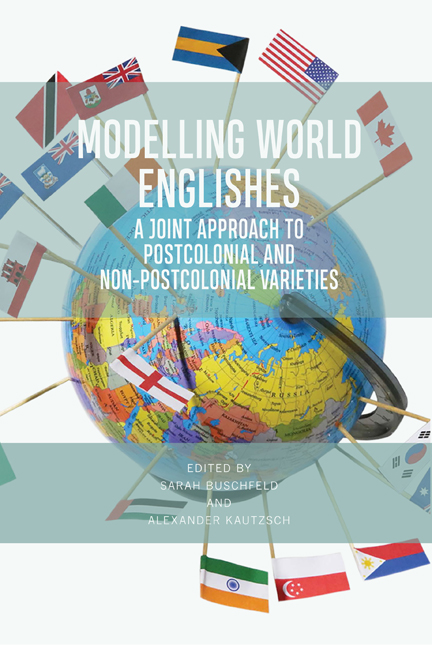Book contents
- Frontmatter
- Contents
- List of Figures and Tables
- List of Contributors
- Foreword
- 1 Introduction
- 2 English in England: The Parent Perspective
- 3 English in Namibia: Multilingualism and Ethnic Variation in the Extra- and Intra-territorial Forces Model
- 4 English in the United Arab Emirates: Status and Functions
- 5 English in India: Global Aspirations, Local Identities at the Grassroots
- 6 English in Singapore: Two Issues for the EIF Model
- 7 English in the Philippines: A Case of Rootedness and Routedness
- 8 English in South Korea: Applying the EIF Model
- 9 English in Japan: The Applicability of the EIF Model
- 10 English in Australia – Extra-territorial Influences
- 11 English in North America: Accounting for its Evolution
- 12 English in The Bahamas and Developmental Models of World Englishes: A Critical Analysis
- 13 Standard English in Trinidad: Multinormativity, Translocality, and Implications for the Dynamic Model and the EIF Model
- 14 Englishes in Tristan da Cunha, St Helena, Bermuda and the Falkland Islands: PCE, non-PCE or both? Blurred Boundaries in the Atlantic
- 15 English in Ireland: Intra-territorial Perspectives on Language Contact
- 16 English in Gibraltar: Applying the EIF Model to English in Non-Postcolonial Overseas Territories
- 17 English in Ghana: Extra- and Intra-territorial Forces in a Developmental Perspective
- 18 Synopsis: Fine-tuning the EIF Model
- Index
3 - English in Namibia: Multilingualism and Ethnic Variation in the Extra- and Intra-territorial Forces Model
Published online by Cambridge University Press: 24 September 2020
- Frontmatter
- Contents
- List of Figures and Tables
- List of Contributors
- Foreword
- 1 Introduction
- 2 English in England: The Parent Perspective
- 3 English in Namibia: Multilingualism and Ethnic Variation in the Extra- and Intra-territorial Forces Model
- 4 English in the United Arab Emirates: Status and Functions
- 5 English in India: Global Aspirations, Local Identities at the Grassroots
- 6 English in Singapore: Two Issues for the EIF Model
- 7 English in the Philippines: A Case of Rootedness and Routedness
- 8 English in South Korea: Applying the EIF Model
- 9 English in Japan: The Applicability of the EIF Model
- 10 English in Australia – Extra-territorial Influences
- 11 English in North America: Accounting for its Evolution
- 12 English in The Bahamas and Developmental Models of World Englishes: A Critical Analysis
- 13 Standard English in Trinidad: Multinormativity, Translocality, and Implications for the Dynamic Model and the EIF Model
- 14 Englishes in Tristan da Cunha, St Helena, Bermuda and the Falkland Islands: PCE, non-PCE or both? Blurred Boundaries in the Atlantic
- 15 English in Ireland: Intra-territorial Perspectives on Language Contact
- 16 English in Gibraltar: Applying the EIF Model to English in Non-Postcolonial Overseas Territories
- 17 English in Ghana: Extra- and Intra-territorial Forces in a Developmental Perspective
- 18 Synopsis: Fine-tuning the EIF Model
- Index
Summary
INTRODUCTION
The English spoken in Namibia is a newcomer to the family of varieties of English around the world. It has been disregarded in most publications on World Englishes (WE) (e.g. Kachru et al. 2009; Kirkpatrick 2010; Kortmann and Schneider 2004; Schneider 2011), although it is sometimes mentioned in passing (e.g. Melchers and Shaw 2011: 159), generally, however, only with reference to (White) South African English (SAfE) (e.g. Trudgill and Hannah 2017: 35). It was not even considered for inclusion in volumes on “lesser-known varieties of English” (Schreier et al. 2010a; Williams et al. 2015), because in Namibia “English has gained a special status only recently” and “fails to meet the criterion of direct transmission” (Schreier at al. 2010b: 10). This fact, however, seems to have attracted the attention of a handful of researchers, who investigate various aspects of English language dynamics in the country (see Schröder forthcoming). Namibia has never been a British colony and the widespread use of English on a nationwide level only started with independence in 1990 and the subsequent introduction of English as the sole official language. This makes this country an interesting case with regard to the purpose of this volume, that is, modeling WE and unifying postcolonial Englishes (PCEs) with non-postcolonial Englishes (non-PCEs).
In their article introducing the Extra- and Intra-territorial Forces Model (EIF), Buschfeld and Kautzsch (2017: 107–111) take the situation in Namibia as a starting point to demonstrate the shortcomings of the Dynamic Model (Schneider 2007), which does not account for the developments of English in non-postcolonial contexts. They reveal that despite the fact that quite obviously “English in Namibia exhibits parallels with postcolonial types of English” (2017: 110), it lacks “important sociopolitical and sociolinguistic factors postulated by the model” (2017: 110), most notably the experience of British colonization. As they elaborate, without British colonists settling the country, the language contact dynamics between the settler strand and the indigenous population are absent. These, however, constitute the central idea of the Dynamic Model, and hence, its applicability to the Namibian case is seriously challenged.
- Type
- Chapter
- Information
- Modelling World EnglishesA Joint Approach to Postcolonial and Non-Postcolonial Varieties, pp. 38 - 62Publisher: Edinburgh University PressPrint publication year: 2020



